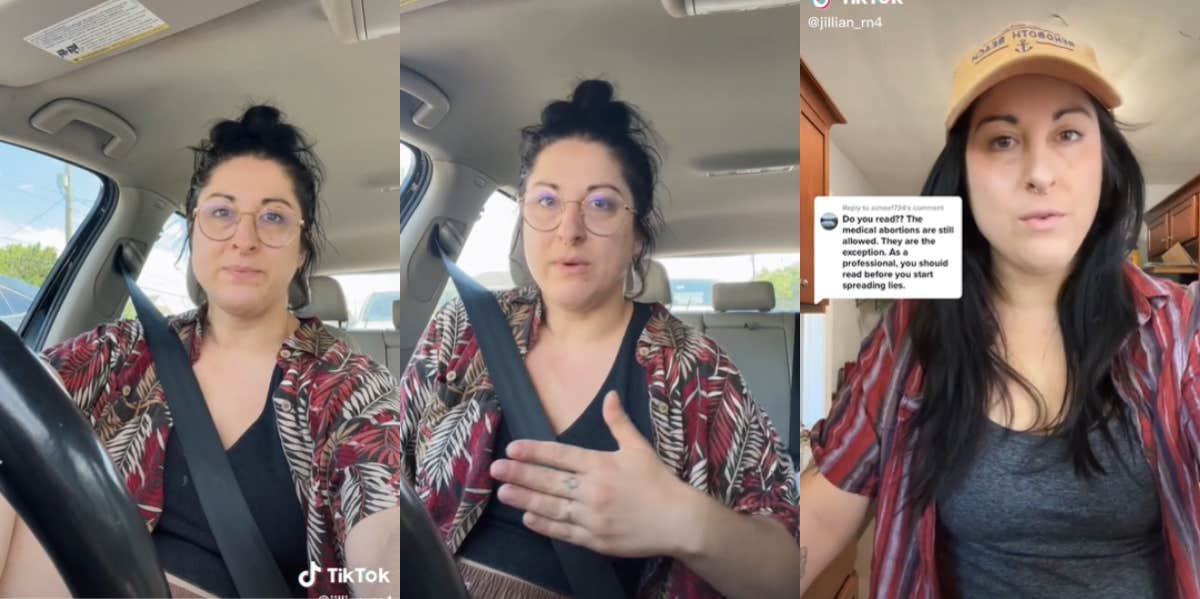Labor & Delivery Nurse Explains The Trauma That Comes With Forced Pregnancy
She's worried for her patients.
 TikTok
TikTok Since the overturning of Roe v. Wade, many people living in the United States are being forced to reconsider what the decision means for their futures.
For one labor and delivery nurse, the changing face of U.S. reproductive health laws is pushing her to reevaluate her career.
The TikToker says she's 'not ready' to be a labor and delivery nurse post-Roe v. Wade.
"Medical abortions are necessary to save a mother's life," Jilian Philips shares in a now-viral video.
She explains that the procedure, which is now being outlawed in many states, is a vital form of healthcare.
RELATED: Protesting Won't Work — How To Make Actual Changes To The Law The Way Republicans Do
As Philips explains, abortions aren’t just for people who don’t want to be pregnant, but also for women and their babies whose lives are at risk due to health conditions.
“I can’t help but think of the women who are gonna be forced to carry their baby who is nonviable with life all the way to term just to deliver a baby and watch it die,” Phillips said.
The nurse explains that birth defects often make early termination inevitable.
Philips discusses the possibility that an unborn baby may have anencephaly, a birth defect where the baby is born without its brain.
Philips said, “In these cases, it’s healthier for the fetus to be terminated early.”
She further explained that even if the mother decides to carry out the pregnancy, she would have to go through a C-section rather than a natural birth which brings on numerous complications for the mother.
In addition, Philips expresses her concerns about what the mother would go through knowing her baby would not be able to survive.
“And on the human side of things… people are telling you congratulations, asking you questions, etc and you know that your baby is not going to survive outside of the womb and you have to deal with that every day,” Philips said.
In a follow-up video, Philips responds to a commenter who told her, "Medical abortions are still allowed. They are the exception. As a professional, you [should] read before you start spreading lies.”
Even states with strict abortion laws typically allow abortions in cases where the pregnant person's life is in danger.
However, Philips claims that this still leaves room for error as, often, there are situations where a women's health is at risk but her life may not be explicitly in danger.
In cases where abortions are typically offered to reduce the suffering of the unborn and the mother, new legal limits may prevent this.
Philips said, “There are some women who choose to carry their pregnancy to full-term in order to meet their baby who may only live a couple of minutes, but that is their choice.”
She further emphasized that no matter the situation, it should be a woman’s choice whether or not she wants to keep her baby.
Now that people across the U.S. are facing extreme obstacles while trying to access vital reproductive healthcare, we need to offer our support where we can.
Local abortion funds across the nation are helping to fund procedures, abortion pills, transportation and lodging when travel is required, childcare, doulas, emotional support, and more. Find your local abortion fund at AbortionFunds.org.
Or consider donating to help independent clinics keep their doors open as they face increased expenses for security, building repairs, legal fees, and community education and advocacy. Donate to clinics via KeepOurClinics.org.
Sanika Nalgirkar is a news & entertainment writer at YourTango based in Seattle, Washington. She has a master's degree in Creative Writing from the University of Washington. You can check out some of her writing on her website.
